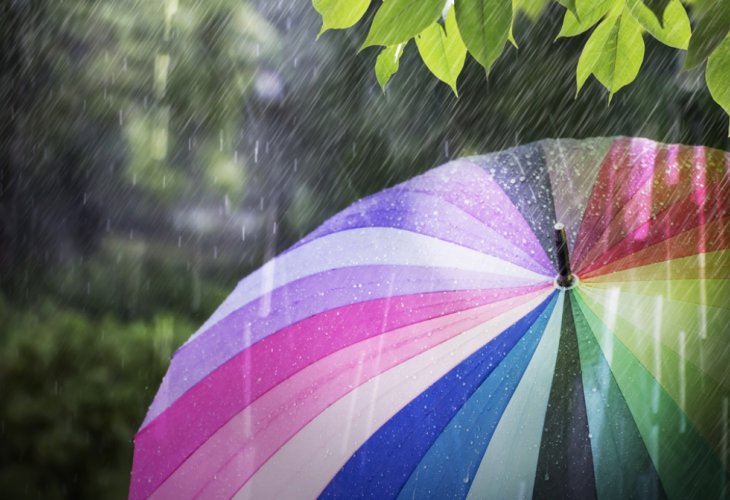Prayers for Rain: 7 Important Laws to Know
What changes in prayer between summer and winter, and when do we begin to pray for rain outside of Israel? Everything you wanted to know about requesting rain in prayer
 (Photo: shutterstock)
(Photo: shutterstock)1. Starting from tomorrow evening's (Monday) prayer, the eve of the 7th of Cheshvan, we begin to pray for rain. According to Sephardic tradition, we recite the blessing of "Barech Aleinu," and according to Ashkenazic tradition, we add the words: "V'ten tal umatar livracha" ("and give dew and rain for blessing") to the blessing of the year.
2. Although it would have been appropriate to ask for "tal umatar" immediately after Sukkot, as that is the suitable time for rainfall, the Sages established that the request should be delayed until the 7th of Cheshvan, so that pilgrims who came for Sukkot could return to their homes.
3. If someone forgot to request "V'ten tal umatar" or to say "Barech Aleinu":
If they have not finished the blessing - they should ask for rain at that point and continue their prayer. If they have already said Hashem's name at the end of the blessing, they should say "lamdeini chukecha" and then request rain.
If they have finished the blessing –
If they remembered before beginning the blessing of "Teka b'shofar gadol," they should say "V'ten tal umatar livracha" or the blessing of "Barech Aleinu" and continue to "Teka b'shofar gadol."
If they remembered before the blessing of "Shome'a tefilla," they should say after "u'shma tefilateinu" - "V'ten tal umatar livracha al pnei ha'adama ki ata shome'a tefilla" and continue with their prayer.
If they remembered after the blessing of "Shome'a tefilla" but before "Retzeh," they should return to "Shema koleinu" and say the request for rain there.
If they remembered after "Retzeh," as long as they haven't said the final "Yihyu l'ratzon" after Elokai Netzor, they should go back to saying "Barech Aleinu" and continue their prayer from there.
If they remembered after completing the Amidah - they should restart their prayer.
If they didn't remember in time - they should pray the next prayer twice. This is called a make-up prayer (Tashlumin).
If in doubt-
The Jerusalem Talmud states that if a person is praying and near the end of the prayer doubts whether they said Barech Aleinu or Barcheinu, the law states that if the doubt occurs within thirty days - they must repeat the prayer because they presumably followed their habitual language pattern. This is the ruling in the Shulchan Aruch. (Section 114:8).
After thirty days, one need not repeat the prayer.
4. A good tip to prevent forgetfulness: If one says 90 times "Rofeh cholei amo Yisrael – Barech Aleinu" (for Ashkenazim: "U'varech kol minei tvu'ata l'tova – V'ten tal umatar livracha") and then doubts during prayer whether they said "Barech Aleinu" or "Barcheinu," they need not repeat because saying it 90 times conditions one's tongue.
Therefore, the following advice is highly recommended: It is appropriate for everyone to say the correct version 90 times on the eve of the 7th of Cheshvan, thereby preventing all the doubts we discussed above.
5. Another tip: Pray from a prayer book and mark the change with your finger. "One should know not to rely on these legal distinctions and therefore make an effort not to err by taking a prayer book and praying from it. If one is not accustomed to using a prayer book - this will serve as a reminder that there is a change in the prayer, and they will remember, ensuring they won't make any mistake in this matter at all, and a blessing of goodness will come upon them.
The Birkei Yosef wrote regarding a person who erred and did not say V'ten tal umatar and has already said "Teka," where the law is that they should say it in "Shome'a tefilla," but is concerned that by the time they reach "Shema koleinu" they will forget. Rabbi Chida suggests that this person can flip ahead in the prayer book to find the blessing of "Shome'a tefilla," place their finger there, turn the pages back and continue praying in order. When they reach the blessing of Shome'a tefilla and see their finger there, they will wonder about this unusual placement, until they remember they need to say "V'ten tal umatar" there, in the sense of 'it is the finger of Hashem.' This will remind them to say "V'ten tal umatar livracha."
6. It's important to remember that by properly studying the laws, a person will be saved from stumbling and erring in the law that they learned. Both because of the law they studied and because they will have special divine assistance accompanying them in fulfilling that law without error. For every law a person studies - a special angel is created to accompany them when they fulfill that commandment. If one studies the laws of Barech Aleinu properly - an angel is created for that student who will be in charge of ensuring they don't forget to say Barech Aleinu.
Similarly, if a person studies the laws of blessing the new moon, an angel is created for them in charge of the blessing of the moon, and so on for the study of each and every law. The role of that angel is to protect the one who studied the law and because of whom the angel was created, and to defend them so they don't make any mistakes in that law.
7. The request for rain on the 7th of Cheshvan is only in the Land of Israel, which needs rain more than other lands. Outside of Israel, the text "V'ten tal umatar livracha" is added on December 5th or 6th (depending on whether February contains 28 or 29 days), 60 days after the Tekufat Tishrei (autumnal equinox).
Rabbi Yaron Ashkenazi explains in a short video the laws for someone who forgets to pray for rain:

